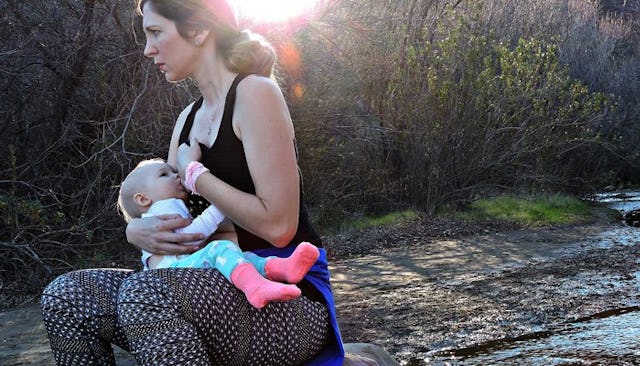Weaning Woes

She looks up at me, her eyes red-rimmed and tear-filled. I watch as one single tear slides up and over her eyelid and then down her cheek. Once one comes, they’ll keep coming, until her T-shirt is wet and her upper lip shiny with despair, until she folds into my arms sobbing, drenching me along with her. It’s bedtime, and she wants to nurse.
My 17-month-old daughter makes the milk sign yet again, her tiny hands opening and closing, opening and closing, as if she’s attempting to conjure milk from thin air. What once made me think of a barnyard, spotted cows lined up, silver pails full of white frothy cream, myself relegated to their ranks, an underappreciated and overworked factory farm animal, a part in the production line of life, now just makes me sad. The little palms wanting, the little eyes pleading, when I have nothing left to give, it makes me so very, very sad.
“Everyone talks about how hard breastfeeding is,” my dear friend said via email the other day when we were swapping notes about stopping, “but no one opens up about how weaning is just as difficult.”
Once I overcame the blood-curdling pain of the first weeks of nursing, once I overcame the fear that I wasn’t making enough, I planned to nurse my daughter for six months at first, and then one year, then “for as long as I can,” until finally, at around 15-months in, I settled on 2 years old, the age to which the World Health Organization recommends, the age when I hoped she’d better understand that it was time, or better yet, decide to stop on her own. I felt blessed to be able to breastfeed at all, but truth be told, I didn’t think I loved it or even liked it that much. Nursing pads. Nursing bras. Nursing covers. Nursing nonsense. But then, out of nowhere, when I truly least expected it, especially with a less than stellar fertility history, I found out I was pregnant.
In those first fragile weeks of this new pregnancy, I worried and I researched, but all together I still felt fine. My supply hadn’t changed. I was still as okay as one can be about getting woken up in the middle of the night by a breast-hungry, baby-toddler vacuum. But when the nausea and vomiting combo hit me like an avalanche and the night-nursing was making me so tired during the day I could hardly keep my eyes open, let alone care for a walking, talking, running, climbing mini-person, I knew that weaning was necessary for my sanity and my health.
All the while, my friend, with whom I share a similar past with infertility, and whose toddler was nearing the golden age of 24 months, was told that to begin treatment to conceive a second child she’d also have to wean. And that’s when, to my surprise, I realized that had I weaned at 12 months or 20, before she was ready or when she was, that I’d still probably feel like this—wistful and reluctant, mournful and a little bit heart-broken, me who didn’t “love” breastfeeding. It was then that something dawned on me: In many ways, I actually needed breastfeeding just as much as she did. When I imagined stopping, being totally done, drying up for my daughter, to make room for my son, I started to cry.
I cried because so much was going to change. I cried for myself, always the one who could soothe her best, filling her belly with warmth, encircling her tiny body with love, just us swaying back and forth in the rocking chair, the sounds of the night mingling with the low rumble of “ocean” sounds we’d put on to help her sleep. I cried because I was her only mother, and she most likely my only baby girl, ever, transformed back into a newborn each time she latched on, her soft sweet face squished into my flesh, a reminder of where she came from, part of me, and now finally asleep in my arms where it truly felt like she belonged.
I cried for the stages of her that had already slipped away, and for the ones I would soon be losing. She was already growing further and further away from baby-dom with each scale slide, each step ascended like a “big girl,” each new word spoken quietly at first, and then so loud and proud, it was as if she’d known it all along. In many ways, I realized that it felt like breastfeeding was all I had left, aside from baby pictures and saved baby clothes, of those first magical months as a mommy.
As we continue down the path of saying goodbye to nursing, with only one brief session each day, I try to remember that this is the point of it all, that babies don’t stay babies forever, that we love them, care for them, and feed them so that they go to preschool, learn math, have their first kiss, and so that finally, they grow up.
This article was originally published on